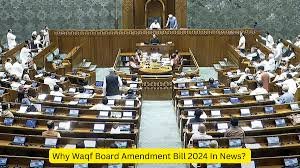Understanding the Waqf Board Amendment Bill 2024
Introduction to the Waqf Board Amendment Bill 2024
The Waqf Board Amendment Bill 2024 has recently made headlines as it proposes significant changes to the administration and management of Waqf properties in India. The bill seeks to amend existing laws governing the Waqf boards, which are responsible for managing endowments made to religious and charitable institutions. This legislative change is aimed at enhancing transparency and efficiency in the management of these properties.
Key Provisions of the Amendment Bill
The Amendment Bill introduces several key provisions that are expected to impact the functioning of Waqf boards across the country. One major provision is the establishment of a Central Waqf Advisory Council, which will oversee the operations of state Waqf boards and ensure compliance with national standards. Additionally, the bill proposes stricter regulations on the use of Waqf properties, including measures to prevent misuse and encroachment.
Implications for Waqf Management
The changes proposed in the Waqf Board Amendment Bill are intended to address longstanding issues in the management of Waqf properties. By increasing oversight and implementing stricter regulations, the bill aims to improve accountability and ensure that Waqf assets are utilized effectively for their intended purposes. This move is expected to enhance the trust of stakeholders in the management of these valuable assets.
Reactions from Various Stakeholders
The bill has garnered mixed reactions from different stakeholders. Supporters argue that the proposed changes are necessary to modernize the management of Waqf properties and prevent corruption. Critics, however, express concerns that the bill may centralize power excessively and undermine the autonomy of state Waqf boards. The debate highlights the need for a balanced approach to reforming Waqf management.
Why this News is Important
Impact on Waqf Property Management
The Waqf Board Amendment Bill 2024 is a significant legislative development that aims to address inefficiencies in the management of Waqf properties. The current system has faced criticism for lack of transparency and accountability. By introducing new provisions, the bill seeks to overhaul the management structure and ensure that Waqf properties are used in accordance with their intended charitable and religious purposes.
Addressing Corruption and Mismanagement
Corruption and mismanagement have been persistent issues in the administration of Waqf properties. The bill’s emphasis on stricter regulations and oversight mechanisms is expected to mitigate these problems. This reform is crucial for maintaining the integrity of Waqf institutions and ensuring that their assets benefit the community as intended.
Enhancing Stakeholder Confidence
The introduction of a Central Waqf Advisory Council and other measures are designed to restore confidence among stakeholders, including donors and beneficiaries. By implementing these changes, the bill aims to foster greater trust in the management of Waqf properties and encourage more effective use of these assets for public good.
Historical Context
Background of Waqf Properties in India
Waqf properties have a long history in India, dating back to the early medieval period. These properties were established through endowments made by individuals for religious and charitable purposes. Over time, the management of Waqf properties became a significant issue, with various challenges including mismanagement and corruption.
Previous Amendments and Reforms
The Waqf Act of 1995 was one of the earlier attempts to regulate the management of Waqf properties. Despite this, problems persisted, leading to calls for further reform. The Waqf Board Amendment Bill 2024 represents the latest effort to address these issues by introducing more comprehensive measures for oversight and regulation.
Key Takeaways from the Waqf Board Amendment Bill 2024
| Serial Number | Key Takeaway |
|---|---|
| 1 | The bill proposes the creation of a Central Waqf Advisory Council to oversee state Waqf boards. |
| 2 | Stricter regulations will be introduced to prevent misuse and encroachment of Waqf properties. |
| 3 | The amendment aims to improve transparency and accountability in Waqf property management. |
| 4 | The bill has received mixed reactions, with some supporting the reforms and others concerned about centralization. |
| 5 | The changes are intended to enhance stakeholder confidence and ensure effective use of Waqf assets. |
Important FAQs for Students from this News
1. What is the Waqf Board Amendment Bill 2024?
The Waqf Board Amendment Bill 2024 is a legislative proposal aimed at amending the existing laws governing Waqf boards in India. It introduces new provisions for better management, oversight, and regulation of Waqf properties.
2. What are the main objectives of the Amendment Bill?
The main objectives of the Amendment Bill are to improve transparency, prevent misuse of Waqf properties, and establish a Central Waqf Advisory Council to oversee state Waqf boards and ensure compliance with national standards.
3. How will the Central Waqf Advisory Council affect Waqf boards?
The Central Waqf Advisory Council will provide oversight and guidance to state Waqf boards, aiming to ensure they adhere to national regulations and manage Waqf properties more effectively.
4. What concerns have been raised about the Amendment Bill?
Concerns include potential centralization of power, which some critics fear might undermine the autonomy of state Waqf boards. There are also worries about how the changes might impact the local management of Waqf properties.
5. Why is reforming Waqf property management important?
Reforming Waqf property management is crucial for addressing issues like corruption and mismanagement, ensuring that Waqf assets are used effectively for their intended charitable and religious purposes, and restoring stakeholder confidence.

